Nebraska Medical Center Earns Gold Award
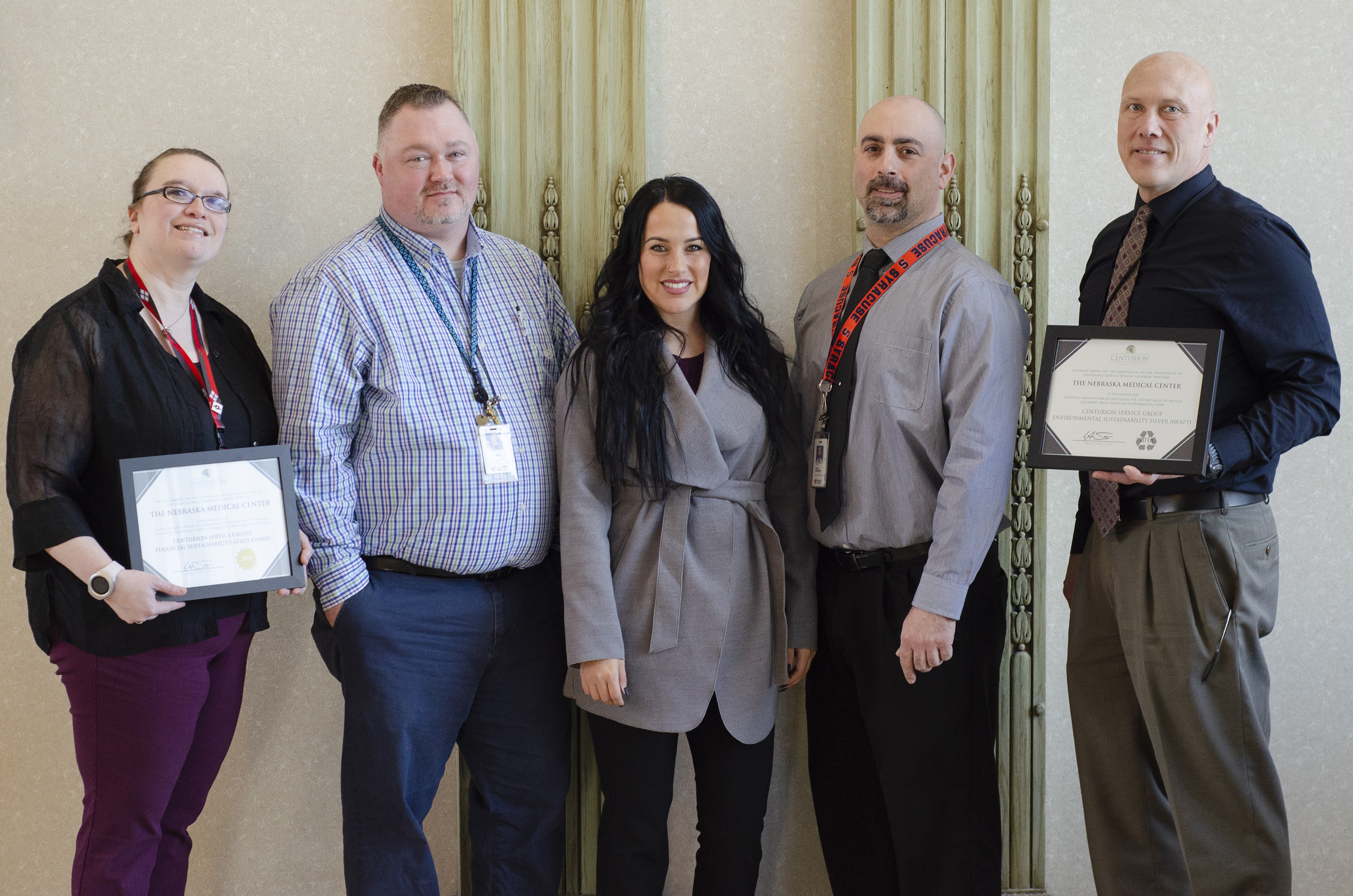
Accepting the Financial Sustainability Gold Award and the Environmental Sustainability Silver Award are Jaime Krueger-Gomez, manager, Asset Management; Anthony Centamore, project manager, Asset Management; Brooklyn Ferreira, regional account manager, Centurion; Dylan DeRoberts, director of biomedical projects, Asset Management; and Bob Ruis, manager, Purchasing. Not pictured is Brittany Pack, clinical engineer, Asset Management.
Nebraska Medical Center recently received the Financial Sustainability Gold Award, 2018, from Centurion Service Group, who annually recognizes top U.S. hospitals for financial and environmental sustainability in responsible equipment management. Nebraska Medical Center also received the Environmental Sustainability Silver Award from Centurion.
“These awards represent the efforts that our organization is making toward a sustainable campus, while achieving better financial outcomes with a reduced effort (labor),” says Bob Ruis, manager, Purchasing.
The Financial Sustainability Award recognizes the nation’s top hospitals for strategic participation in Centurion Service Group’s surplus medical equipment program increasing the lifetime value of medical equipment, creating revenue by freeing important resources to access new technology and improve patient care. The Environmental Sustainability Silver Award represents having more than 250 pieces of medical equipment sold, and helping to avoid added waste in landfills.
Centurion Service Group is a medical equipment auction house that handles the challenges of surplus medical equipment. Its sophisticated infrastructure streamlines the process for equipment removal.
Being awarded “Gold” level is an achievement in responsible asset management as a solution to the challenges surplus equipment can pose, and an accomplishment in accessing the financial benefits it generates through auction with Centurion Service Group. Hospitals achieving “Gold” level achieved annual medical equipment sales of at least $50,000. Liquidating surplus medical equipment through auction represents a significant reduction in environmental harm, as well as, the positive impact of making medical equipment available for resale to underserved communities the world-over.
“By collaborating with Centurion, we have been able to be more successful at the disposal of medical devices,” says Jaime Krueger-Gomez, manager, Asset Management. “Centurion will take anything we have, whether it is broken or fully functional, which makes it a one-stop shop for asset disposal.”
Most importantly, the gold designation represents the sustainability practices by Nebraska Medicine by keeping this surplus equipment out of landfills.
Melanie Stewart, campus sustainability manager, applauds the efforts being recognized by this honor.
“From a sustainability standpoint, the process team have put into place to take equipment out of our system at the appropriate time so it can be refurbished and reused at other places is a great practice,” says Stewart. “If they didn’t send this equipment in, it would likely be in the trash, as it’s made from multiple materials and not able to be recycled without being fully disassembled. It’s a lot of equipment and heavy, so our waste stream would look very different if they weren’t doing this.”
Ruis adds that the Financial Sustainability Gold Award highlights just one sustainability success.
“I want to encourage anyone, who is preventing items from going to the landfill, to share what they are doing with Melanie Stewart,” says Ruis. “There are many of you who have implemented things that are going unnoticed and uncaptured. This award, along with all the other sustainability efforts in the organization gets us one step closer to our 2030 goal.”
To learn more about our 2030 sustainability goals, click here.
Sustainability in Healthcare
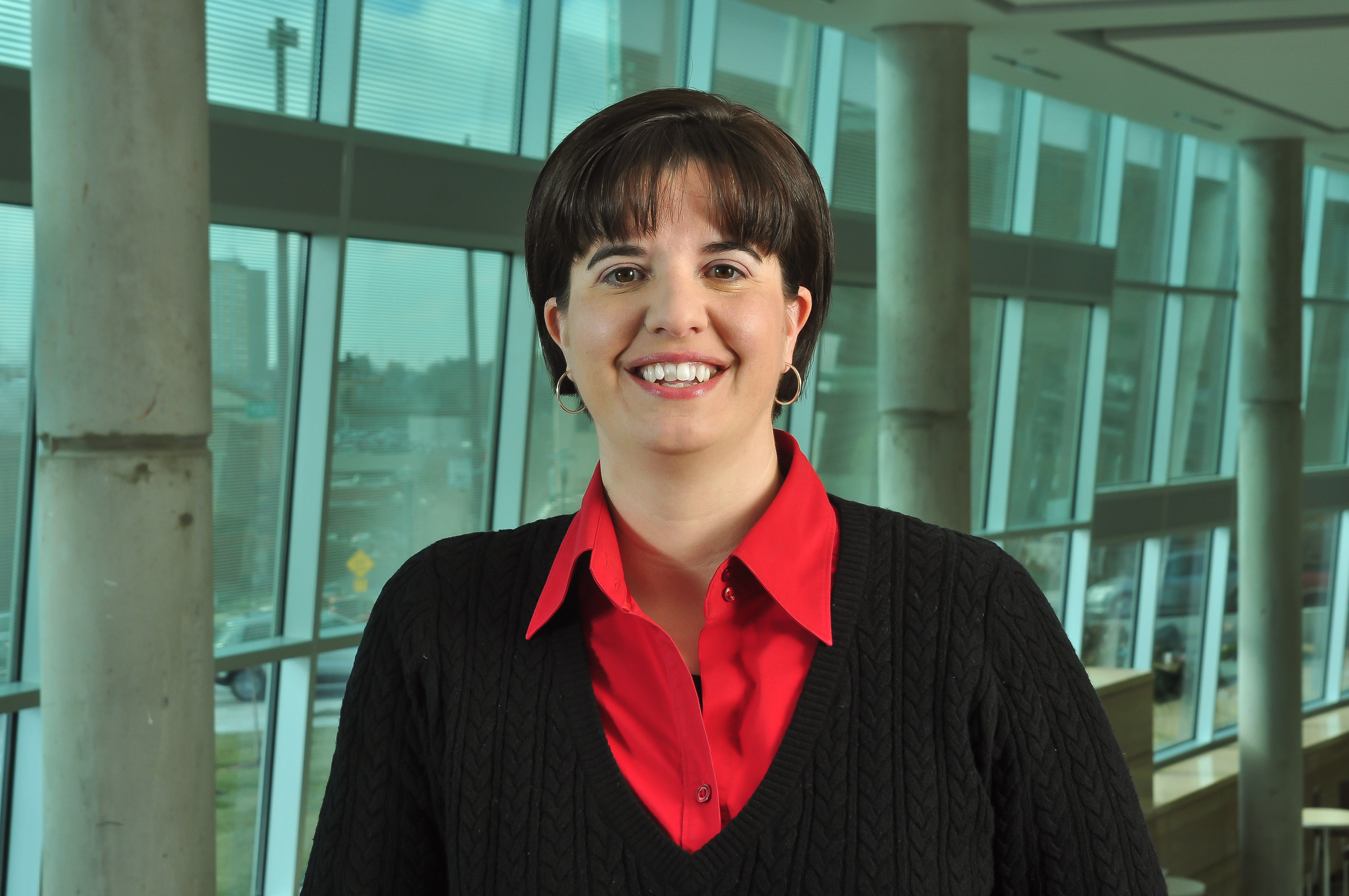
Melanie Stewart from the UNMC and Nebraska Medicine Office of Sustainability will discuss sustainability’s connection to health and wellbeing at the next Olson Center Brown Bag Lecture from noon to 1 p.m. on Mar. 19 in the Eppley Science Hall Amphitheater.
Many think of sustainability as “being green” or “saving the environment” but being sustainable directly relates to your health. It’s a connection that can be easily overlooked, but directly impacts your daily life. As part of our healthcare mission, we can take many actions to make a difference in the health of ourselves, our family, and future patients; thus creating a healthy future for all.
“The misconception that we are working to save some other place creates a lot of confusion” Stewart said, “Sustainability is directly tied to human health, our health, and healthy outcomes; directly tied to our mission of ‘creating a healthy future for all’”.
Stewart never planned on being a public speaker but the Med Center’s ambitious goals, strides towards achieving them, and the emphasis on health has challenged that part of her path.
In addition to the Olson Center Brown Bag, Stewart spoke at last fall’s Omaha Women’s Health and Wellness Conference, MAPA’s “Closing the Gap” panel discussion on transportation, and to the Midtown Business Association. This spring she will also speak to a few other companies (primarily their wellness teams), and will be on a panel at the Nebraska Climate Conference in Lincoln.
“I’m honored to be asked, and appreciate the opportunity to not only help people understand the connection to health, but also to share our progress. Our mission states that we want to “lead the world” and we are—what we have been able to cost-effectively accomplish puts us in rarified air with other hospitals and medical centers and certainly distinguishes us regionally.” Stewart said.
Stewart encourages anyone who wants to know more about the connection of sustainability and health to reach out.
Nursing credit is available for the Olson Center Brown Bag, see Upcoming Events for complete details.
Biodegradable vs. Compostable
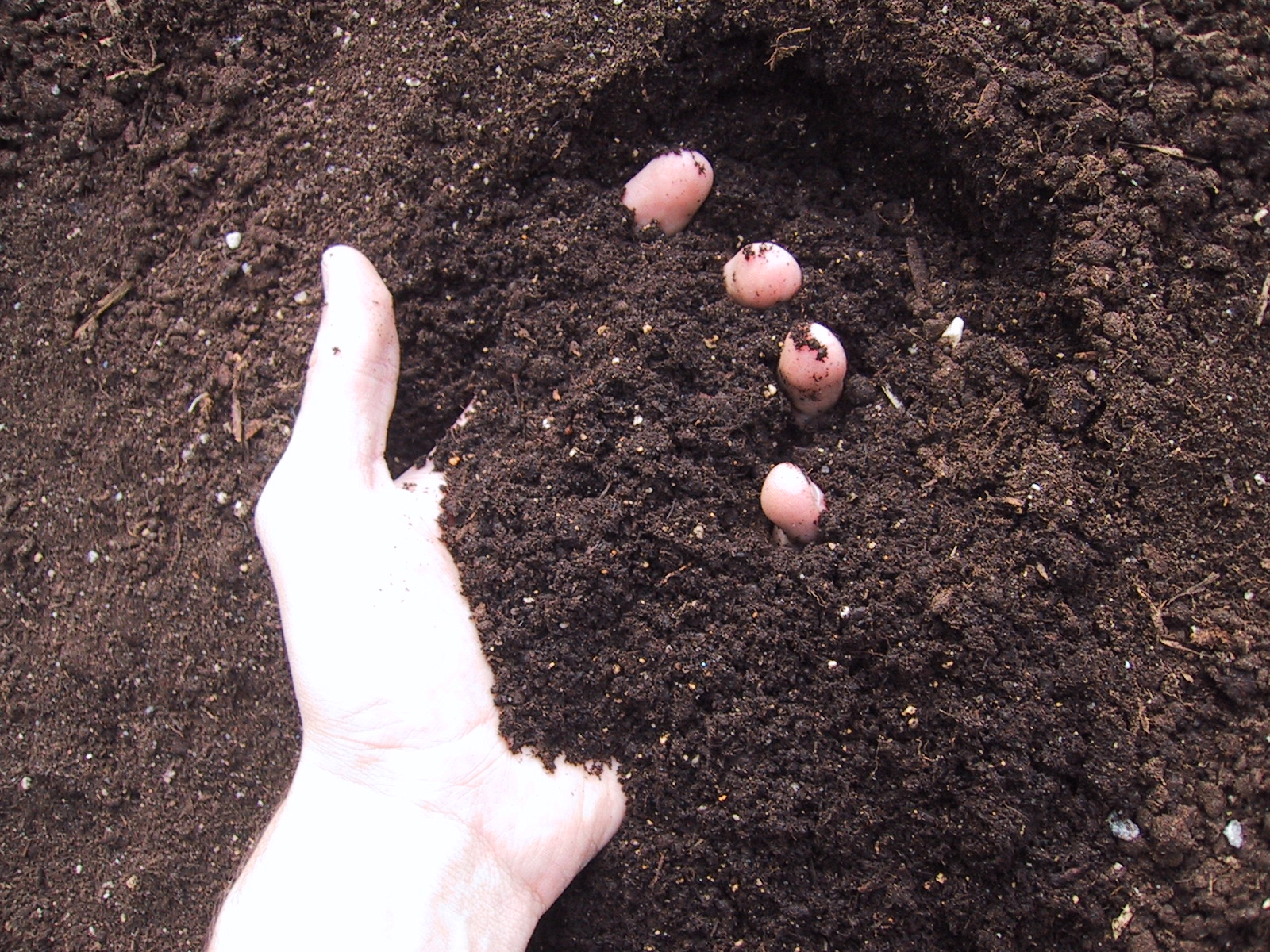
By Tina Spencer
We know we need to reduce and reuse first, but buying products that can be diverted from the landfill is important too. That leads to one of our most frequently asked questions: “what is the difference between biodegradable and compostable?”
Unfortunately, compostable and biodegradable are often used interchangeably. But they’re not the same thing. Biodegradable means that a product can be broken down without oxygen and turn into carbon dioxide, water, and biomass within a reasonable amount of time. Biodegradable products usually break down into something natural, but can leave behind trace metals. Everything will biodegrade eventually, so labeling something as biodegradable means the consumer really has to do some research. For example, aluminum cans will biodegrade in the ocean in about 176 years while hard plastic bottle caps will take approximately 400 years—not the positive image you may have been picturing.
Compostable items break down to carbon dioxide (which can be stored, instead of released into the atmosphere), water, and other forms in ~90 days and leaves no toxic residue. Composting occurs in certain conditions, and results in a rich hummus full of nutrients. All compostable items are biodegradable, but not all biodegradable items are compostable.
Composting can remove 20-50% from your household waste stream, save you money, reduce the burden on landfills, and replenish your lawn, trees or garden for free. Compost helps retain moisture, makes soil easier to work (clay soil anyone?) suppresses plant diseases and pests, all while reducing the need for chemical fertilizers. In addition to trapping carbon dioxide it also prevents the creation of methane that occurs in landfills. Methane contributes to climate change and displaces breathable oxygen.
Note that some items are listed as “commercially compostable”. These items need more heat to break down, which means a bigger pile than what you have in your yard. The process and results are the same. Items are generally more heavy-duty in composition, and meat/bones also falls into this category.
Composting at home doesn’t have to be difficult or time consuming, but there are some things you need to know before getting started. You need the right mix of ‘browns’ (dry leaves/plants, twigs) and ‘greens’ (food scraps, coffee grounds) and water is needed. If you compost correctly, you won’t attract vermin and it won’t stink. Try the resources here and here to get started.
photo credit: freeimages.com/mikeberg
Renovation provides unique opportunity

The McGoogan Library of Medicine is about to undergo a renovation, and in preparation many medical journals and magazines will be archived in a different manner. As a result, the library has an abundance of plastic containers originally used to hold the library’s thousands of periodicals.
The Library reached out to LiveGreen to see if they could be recycled. They can, but they are still in good shape and with so many containers (1,300 and counting!) we wanted them to be reused if possible. The containers can be re-used to hold magazines or other similar items at home or work, or repurposed to hold or store any other item you can think of. The bins are range in size from approximately 10”H x 7 ½ ”D x 4”W to 12”H x 9 ½” x 4”, depending on the item they held (see picture for example).
But wait there’s more! We want to see your creativity in repurposing these containers. We’ll ask you to share a picture and explanation of your efforts with LiveGreen@unmc.edu , winners will be selected during Earth Month (activities announced soon!) and receive prizes. Whether you’re the crafty type or you just need something to hold your whatchamacallits, these free durable plastic bins may be what you need. Can they store pasta packages in your pantry? Gadgets in your garage? Action figures in Adam’s room? Or maybe modified into something else completely? We look forward to finding out!
To share as many of the bins as possible with our campus community, the Library is hosting two pickup events:
Who: anyone interested, tell your friends
What: pickup containers; first come, first served
When: Thursday, February 21 from 7:30am to 9:30am & Friday, February 22 from 2:00pm to 4:00pm
Where: Wittson Hall, 6th Floor lobby of McGoogan Library
The event is BYOB, bring your own box, particularly if interested in taking more than a few containers. The Library does not have bags, boxes, or carts for those taking the containers. The Library will not give away containers at any other times. If you can’t attend, see if a friend can pick some up for you. Don’t forget, the Library will be open at this time, please be considerate of others when picking up your containers.
Climate Change Action in Healthcare
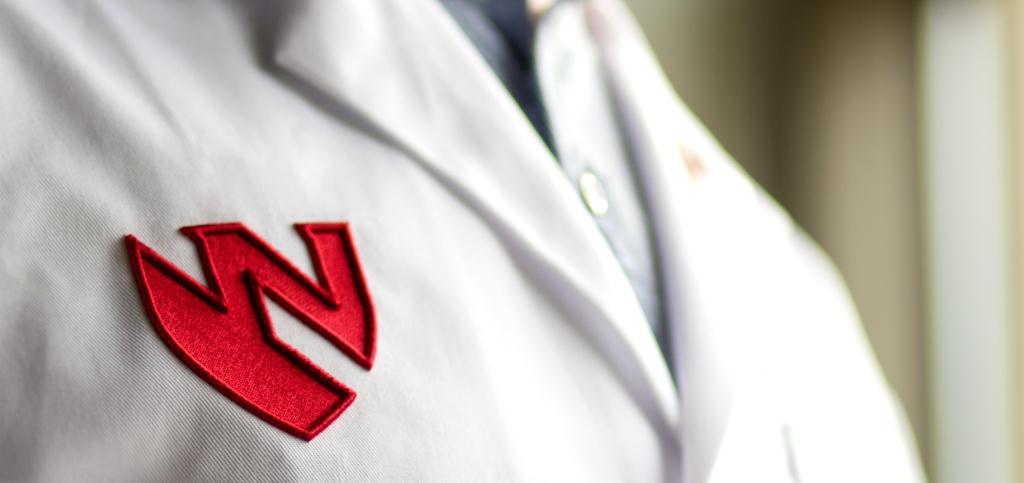
Last month the New England Journal of Medicine published an article regarding climate change and human health. It expands on a 2014 report issued by the World Health Organization, predicting that rising global changes would, through a variety of maladies, kill an additional 250,000 people each year by 2030. The WHO report did not discuss deaths attributed to climate change related refugees, violence, or war, as outlined in a report by the Pentagon last week.
While frightening in and of itself, the NEJM article asserts the WHO numbers are “conservative”. Depletion of drinkable water, reduced food production, pollution, overfishing, biodiversity loss, ocean acidification, and invasive species will amplify the effects on public health and health care systems:
“If no additional actions are taken, then over the coming decades, substantial increases in morbidity and mortality are expected in association with a range of health outcomes, including heat-related illnesses, illnesses caused by poor air quality, undernutrition from reduced food quality and security, and selected vectorborne diseases in some locations; at the same time, worker productivity is expected to decrease…”
It can be easy to insulate ourselves from this global issue—rising sea levels and the like won’t directly affect us in Nebraska. Unfortunately that’s not true. Changes outlined in a Unicameral-requested UNL report will affect our economy, environment, and people negatively—we will not be immune to any effects.
Health care has a special role in climate change. If the U.S. health care sector were its own country, it would account for 10% of US greenhouse gas emissions and would rank 7th in emissions production internationally; a major contributor of air pollution. Additionally, many feel that physicians and other patient care professionals have been called to care for people, safeguard their health, and prevent future issues, so combatting climate change is part of their mission.
At UNMC & Nebraska Medicine our mission is “…to create a healthy future for all..” That mission is why we have a sustainability master plan, why we work to reduce energy use (thereby reducing emissions), reduce waste, and promote active transportation; all part of our 2030 goals. We are reducing our impact, helping to prevent illnesses, improve health, and be sustainable leaders in the health care field.
Solar Panels Up, Operational

By Melanie Stewart
Last fall we told you about our partnership with Omaha Public Power District, to bring solar panels to Med Center rooftops.
We are happy to report that they are installed and producing electricity, making this installation the largest rooftop array in Nebraska.
The 1,487 solar panels sit atop the three largest roof surfaces on campus — the Michael F. Sorrell Center for Health Science Education, the Stanley M. Truhlsen Eye Institute, and the Harold M. and Beverly Maurer Center for Public Health.
The panels can generate up to 500 kilowatts of solar-powered electricity to help power the campus; and “its’ energy production will equal the average annual electricity use of 60 homes in OPPD’s service territory.” said Jared Friesen of Morrissey Engineering, which designed the project. The solar arrays are using a combination of east and west-facing panels, built to maximize the energy produced in each square foot of roof space used, while reducing shade between rows, and limiting the overall weight added to the roof, Friesen said.
Darren Dageforde, executive director of utilities and energy utilization for UNMC, said the med center has already made great strides in reducing energy use and increasing efficiency.
“Having a renewable energy source on campus demonstrates our commitment to being carbon neutral by 2030 and parallels our mission to create a healthy future for all individuals and communities.”
For maximum efficiency, the three buildings with the solar panels will use the electricity generated first. Any additional electricity can be used by other campus buildings but will not be stored. This consistently reduces the overall electric demand on campus.
The project is part of an Interlocal Agreement between the OPPD Board of Directors and the UNMC Board of Regents. It is the latest in a number of energy-efficiency efforts added to the campus since 2012.
Interested in solar at your home? The cost to install solar panels continues to decline, OPPD has outlined a process, Google’s Project Sunroof can help map your home’s solar exposure, and Nebraskans for Solar has great resources on all facets of solar.
Sustainable New You

Lots of us start the new year with new intentions. Some are formal resolutions, some are timed goals, others are just intentions…but almost all will likely improve your health in some way. Sustainable habits are also healthy habits—sustainability is tied directly to your health which is why it’s part of our mission. So with that in mind, LiveGreen has some easy actions you can take to help meet your personal health goals and be more sustainable.
Garden. It doesn’t matter what your goal is, gardening will help. It increases your physical activity and burns calories, it relieves stress, it’s a good activity to do with kids (and it’s good for them), and it can increase your happiness—just make sure it’s fun, and not a chore. If flowers and plants are your thing that’s great, but if you grow food you get extra benefits: you’ll eat more vegetables (don’t we all need to do that??), you can eat less meat, save money, save time at the store, reduce waste/plastic from shipping and packaging, and reduce emissions from production and shipping.
If you don’t have yard space, consider a community garden (my neighborhood used some space at a nearby church which reduced their maintenance and irrigation costs), plant items in pots inside or outside, or co-op a garden with a friend or neighbor. If all else fails, hit the farmer’s market and don’t forget to bring your own bag.
Consider using homemade cleaners (find our tested recipes here). They save you money, save you storage space, use less plastic, and reduce your exposure to chemicals. Did you know that regular exposure to cleaning sprays exposes you to the same health problems as smoking a pack of cigarettes a day?
Change your transportation–Participating in TravelSmart is always free, a great way to save money, is generally better for your health, and reduces both emissions and traffic congestion. Combine trips when running errands and consider “Switching a Trip” not associated with commuting for a greater effect.
Don’t forget, you don’t have it do it all at once; start with a small garden, switch one trip a week, find one cleaner to swap out, etc. and then build on your successes from there.
Changes to Daily Rate Flex Parking
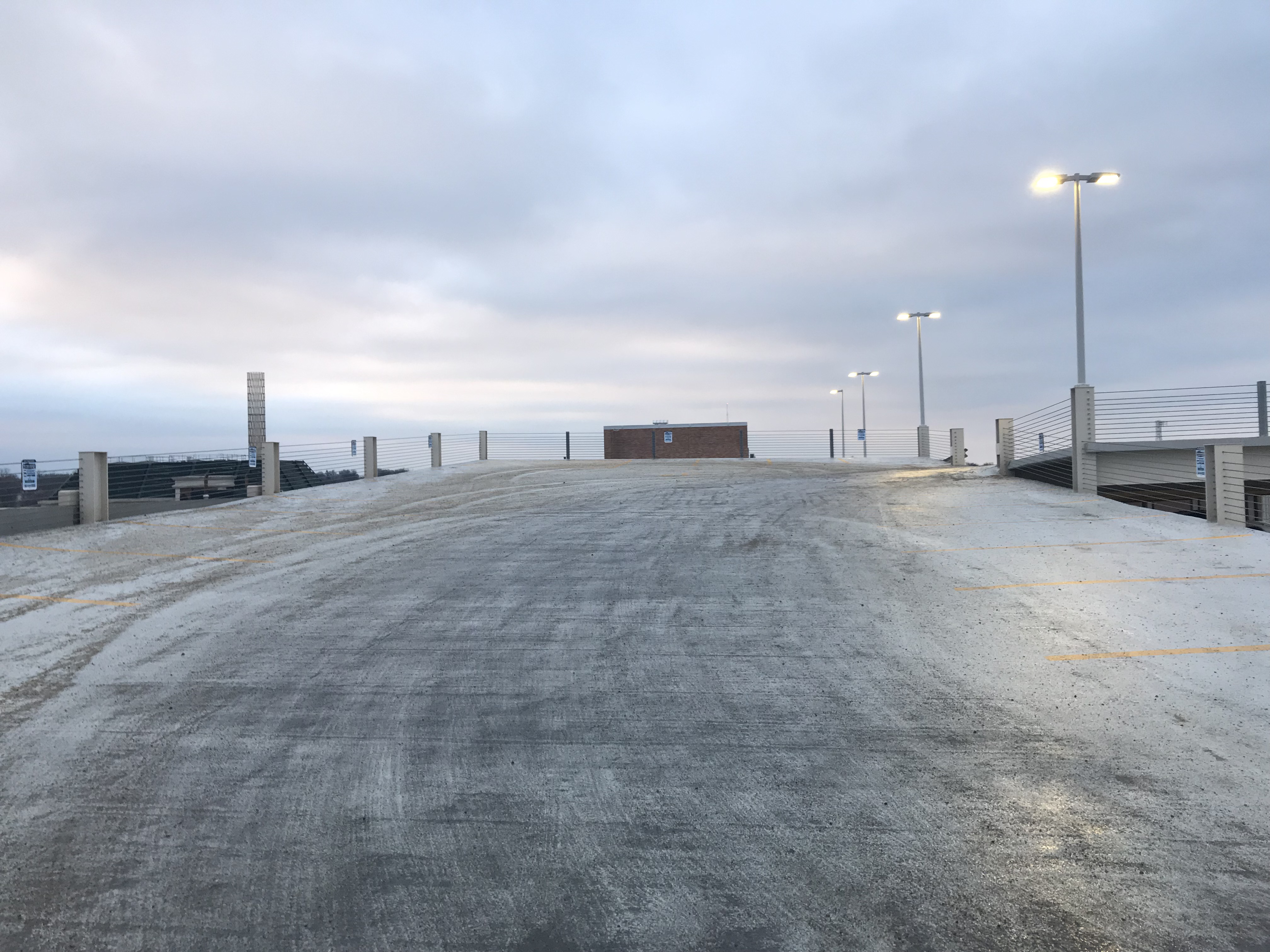
The completion of the construction in parking lot 1 has allowed Parking to add much needed daily rate flex parking (DRFP) stalls in two locations on the 42nd & Dewey campus.
Lot 6, newest parking garage located on the corner of 41st & Dewey Streets:
Twenty one (21) stalls were added in Lot 6; the stalls are all located on the top level and are marked with standard DRFP signage for daily rate parking only (picture above).
Lot 17, located on the southwest side of campus. To access Lot 17, enter at 45th & Leavenworth:
Fourteen (14) stalls were added to Lot 17, the stalls are adjacent to the stairway that leads from Lot 17 to Emile Street.
Please refer to DRFP Map for exact locations, as well as photographs of locations for your reference.
As a reminder, Daily Rate Flex Parking spaces are for individuals who are coming to the 42nd and Dewey campus for work related purposes and do not have a parking permit. They are often TravelSmart participants but can also be colleagues who work at other locations coming for meetings or to cover shifts, or casual employees, etc. that have inconsistent schedules and choose not to have a parking permit.
Colleagues and students with a parking permit cannot use Daily Rate Flex Parking and will be ticketed if they do so. If you do not have your parking permit with you, please call the Parking Office for validation.
For information on using Daily Rate Flex Parking, to get the free Park Omaha app (which can also be used to park in other locations in Omaha), or website payment instructions, please visit our website.
Are you a TravelSmartie? Participating in TravelSmart is always free, a great way to save money, is generally better for your health, and reduces both emissions and traffic congestion.
Not sure? If you have thought of riding the bus, walking, biking, or carpooling, but aren’t sure where to start, need help finding a bus route or carpool partner, email TravelSmart@unmc.edu and we will be happy to help! There’s no commitment required in looking at options or contacting us, and the free emergency ride home will be available to you too.
Radon Action Month

January is Radon Action Month.
Radon is a naturally occurring radioactive (?!?) gas released in soil, rock and water as an indirect decay product of uranium or thorium. As radon itself decays, it produces solids that stick to surfaces, such as dust particles in the air. If the contaminated dust is inhaled, these particles can stick to the airways of the lungs and increase the risk of developing lung cancer. Radon is tasteless and odorless, and there are no early-warning physical symptoms to tell you you’re getting too much exposure.
Exposure to radon is the second biggest cause of lung cancer after cigarette smoking, and is the leading cause of lung cancer among non-smokers. Combined exposure to radon and cigarette smoke increases the likelihood of dying from lung cancer. Click here to see a video made for physicians by the Iowa Cancer Consortium.
The average outdoor level of radon is insignificant. However, radon can build up to dangerous levels inside our homes, particularly in crawl spaces and basements. It can be spread throughout the house by the heating and cooling system. Because radon is heavier than air, opening the windows or living in a drafty house doesn’t decrease the level of exposure.
One out of every two radon tests conducted in Nebraska shows elevated levels. Eastern Nebraska and Western Iowa are in a “Zone 1”designation from the EPA, indicating some of the highest levels of measured radon.
So what can you do to protect yourself? The U.S. Surgeon General and Environmental Protection Agency (EPA) recommend that all homes be tested for radon and installing radon abatement in homes with radon levels at or above 4pCi/L. The World Health Organization sets the threshold for remediation at 3.0 pCi/L. The EPA also recommends that people in homes with levels between 2 pCi/L and 4 pCi/L consider fixing their homes.
Testing and fixing your home is relatively easy. Test kits are available at local hardware stores and home centers, as well as by mail, and you can conduct the test yourself. The Nebraska Department of Health & Human Services has directions for testing and for installing a radon abatement system, as well as helpful information if you want to have a professional do these tasks for you. Homes should be tested every couple of years, even if a radon abatement system is in place.
Hit the Bottle

The New Year always seems to bring about resolutions, many surrounding health. Hydration is an important aspect and bottled water seems like and easy solution. But before you buy that bottle consider:
- Bottled water is 3,000% more expensive per gallon than tap water.
- The federal government requires far more rigorous and frequent safety testing of municipal drinking water. Bottled water generally is no cleaner, safer, or healthier than tap water.
- Up to 50% of all bottled water comes straight from the tap—no extra filtering.
- Bottled water samples have been shown to contain phthalates, mold, microbes, benzene, trihalomethanes, arsenic, and even pieces of plastic.
- It’s worse if that plastic bottle is heated (left in hot car, etc.). Heat helps to leach synthetic chemicals (see above) which have been linked to cancer and promotes bacterial growth that can be passed on to you and negatively affect your health.
- Bottles are not shipped in refrigerated trucks, so there’s no way to avoid the risks.
- It takes 17 million barrels of oil to make the bottles to meet America’s annual bottled water consumption. That’s enough to fuel more than 1 million cars for a year!
- That same process also emits 2.5 million tons of CO2.
- Only 14% of plastic water bottles get recycled. That mean 86% go to the landfill or become litter.
And none of these stats pertain to other plastic bottle beverages—when you consider pop, juice, sports drinks, etc., the effect is staggering.
Sadly, there’s more.
The world spends more than $100 billion on bottled water a year which gives some corporations incredible power. They work through governments to privatize water sources. This is so prevalent it’s contributing to worldwide water scarcity. Occupants of third-world countries may be forced to walk for a day to get water clean enough to drink and/or are left without a basic human necessity. We are affected too. Companies are taking water from streams and springs, even in drought stricken areas, draining crucial resources and leading to increased pollution.
So, what can you do?
- Don’t buy anything in plastic bottles.
- Instead, buy a reusable bottle (stainless steel or glass is the healthiest choice) and fill it with tap water. Buy a filter if you need to.
- Order carafes of water with reusable glasses at your next event.
- Refuse plastic-bottled beverages at events and parties.
- Educate yourself and others, starting with this video.
